The delivery workers on the frontline of Greece’s new economic crisis
It’s 4:00 pm on a sunny Friday afternoon in Athens and the corrugated iron grille of Nonna Edda pizzeria is raised only halfway. Normally, the three workers inside would be preparing for a busy night of curbside diners and walk-in takeaway orders. Of course, that was before the global coronavirus pandemic, and before the Greek government placed the country on a nation-wide lockdown that has lasted for more than a month already.
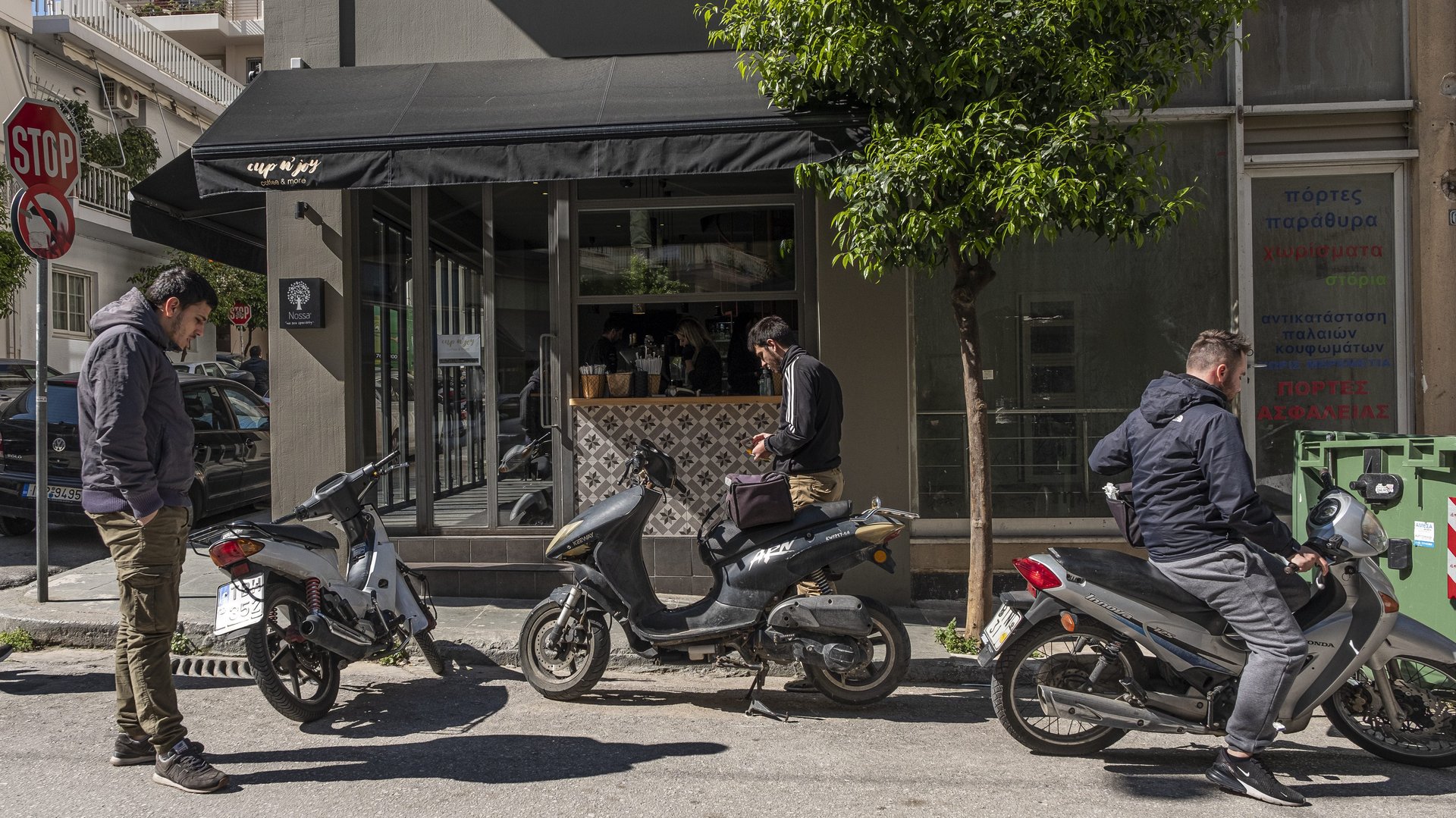

It’s 4:00 pm on a sunny Friday afternoon in Athens and the corrugated iron grille of Nonna Edda pizzeria is raised only halfway. Normally, the three workers inside would be preparing for a busy night of curbside diners and walk-in takeaway orders. Of course, that was before the global coronavirus pandemic, and before the Greek government placed the country on a nation-wide lockdown that has lasted for more than a month already.
Now workers start the shift preparing for an evening of delivery orders. “Delivery is what’s keeping us [afloat]. This is what keeps the business going now,” says Miltos Pagonis, who handles the phone orders and cash register at the pizzeria.
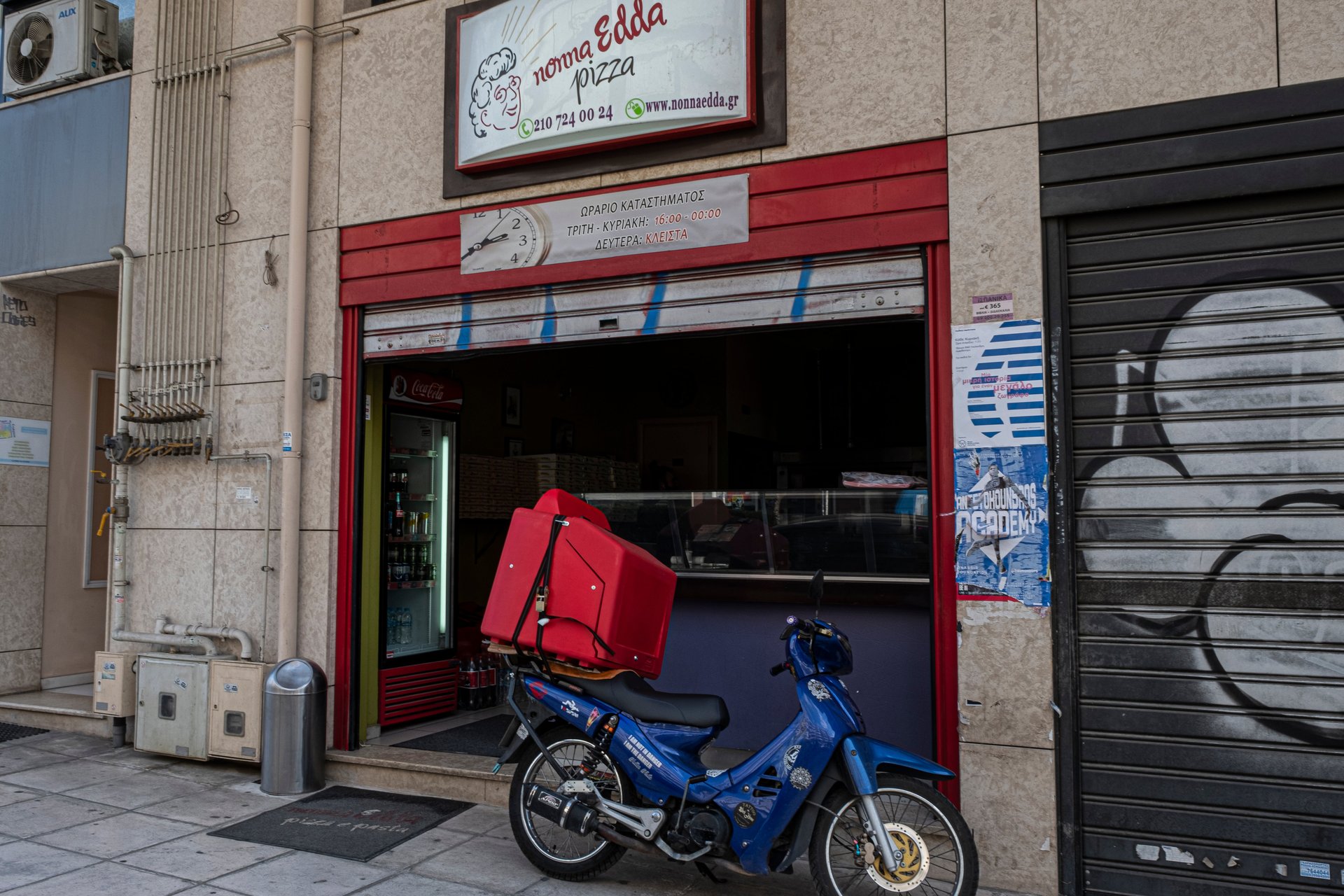
Twenty-seven-year-old George Tsogkas has been delivering orders for Nonna Edda for just over a year. His workday starts at noon with a thorough cleaning, when he helps scrub the pizzeria top to bottom. Gloves, masks, and extra bottles of disinfectant are placed on the counters and workspaces. Together, the staff preps ingredients and materials in the kitchen.
Next, Tsogkas assembles cardboard delivery boxes. Once at least two dozen are complete, the grille at the front of the shop is raised, and his delivery shift officially begins.
Although much has changed about daily life in Athens, Tsogkas says aspects of his work routine are largely the same; “Technically, it’s not much different in terms of safety measures.” Although he now always wears gloves, a face mask, and carries antiseptic sanitizing gel, his job has always been risky, he says. “This work is by nature dangerous since we’re on the road all day, and there’s a high mortality rate.” If you ask delivery workers in most Athens neighborhoods how they feel about their vocation, chances are you’ll hear about how crazy or surreal it is before they discuss feeling afraid. As mostly young men, most don’t to see themselves as the demographic at risk of severe illness or death from the virus.
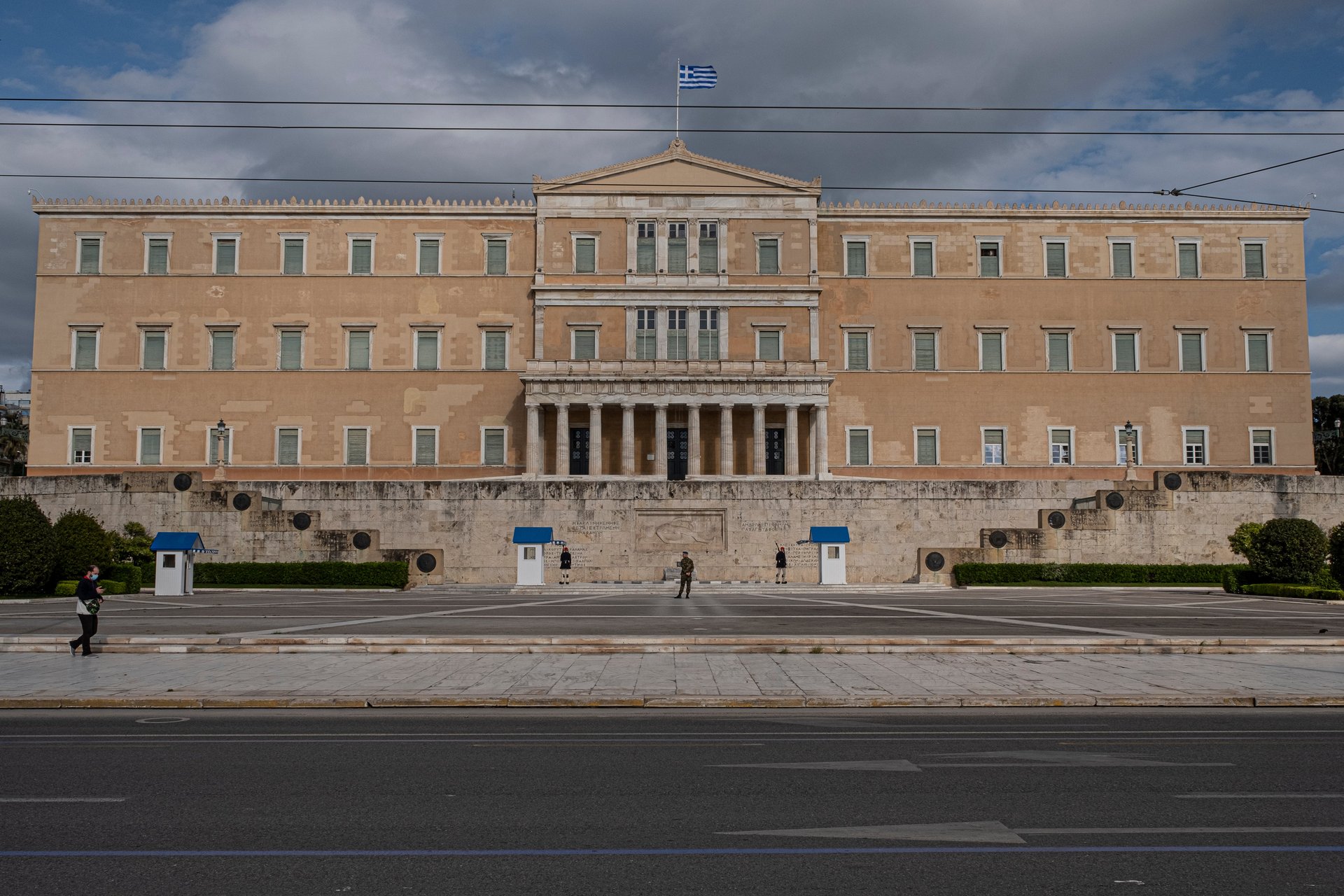
Of course, Covid-19 has added to the peril of delivery. While more people in the city are using online delivery services during quarantine, many of which offer contact-free delivery, not everyone uses smart phones or charge cards, meaning delivery workers still need to get close enough to hand over food and take cash payments.
Tsogkas takes all the precautions he can. “We have gloves, I also wear a mask, and I frequently use hand sanitizer,” he says. He says customers usually come outside their apartment doors, “So that we don’t have to go into their homes or get too close to them, for our and their safety.” Sometimes his customers hand money over in small plastic bags.
He worries, but his delivery job is the only work he has, and he lives alone. “If I could somehow cover my [financial] responsibilities, I would stop working, to be safer.”
A new reality
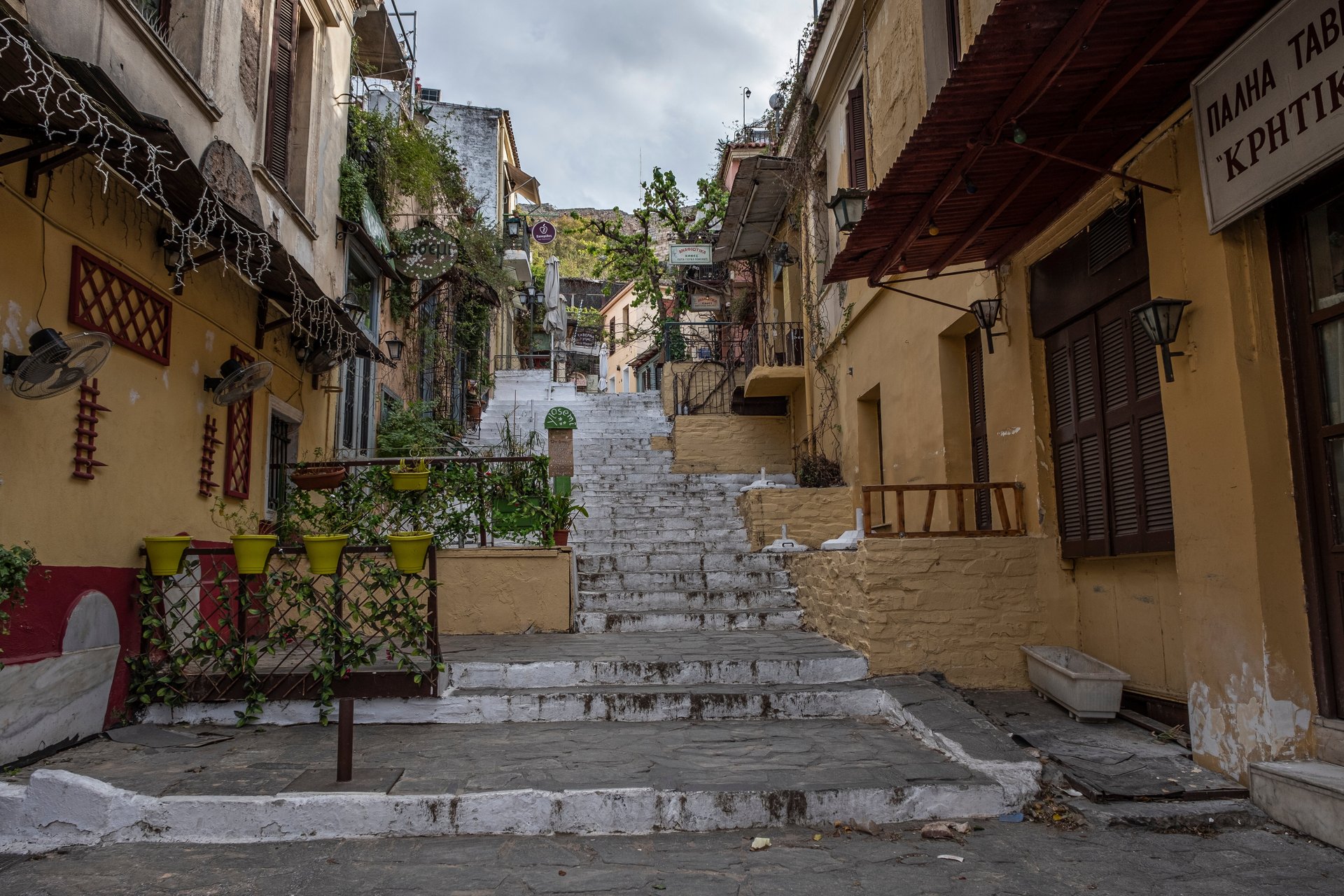
Under Greece’s current lockdown order, you’re allowed to leave your home for one of six reasons: essential work, going to the supermarket or the pharmacy, taking care of an ill acquaintance or relative, attending a funeral, returning to your paternal home as they call it, or getting physical exercise or walking a pet.
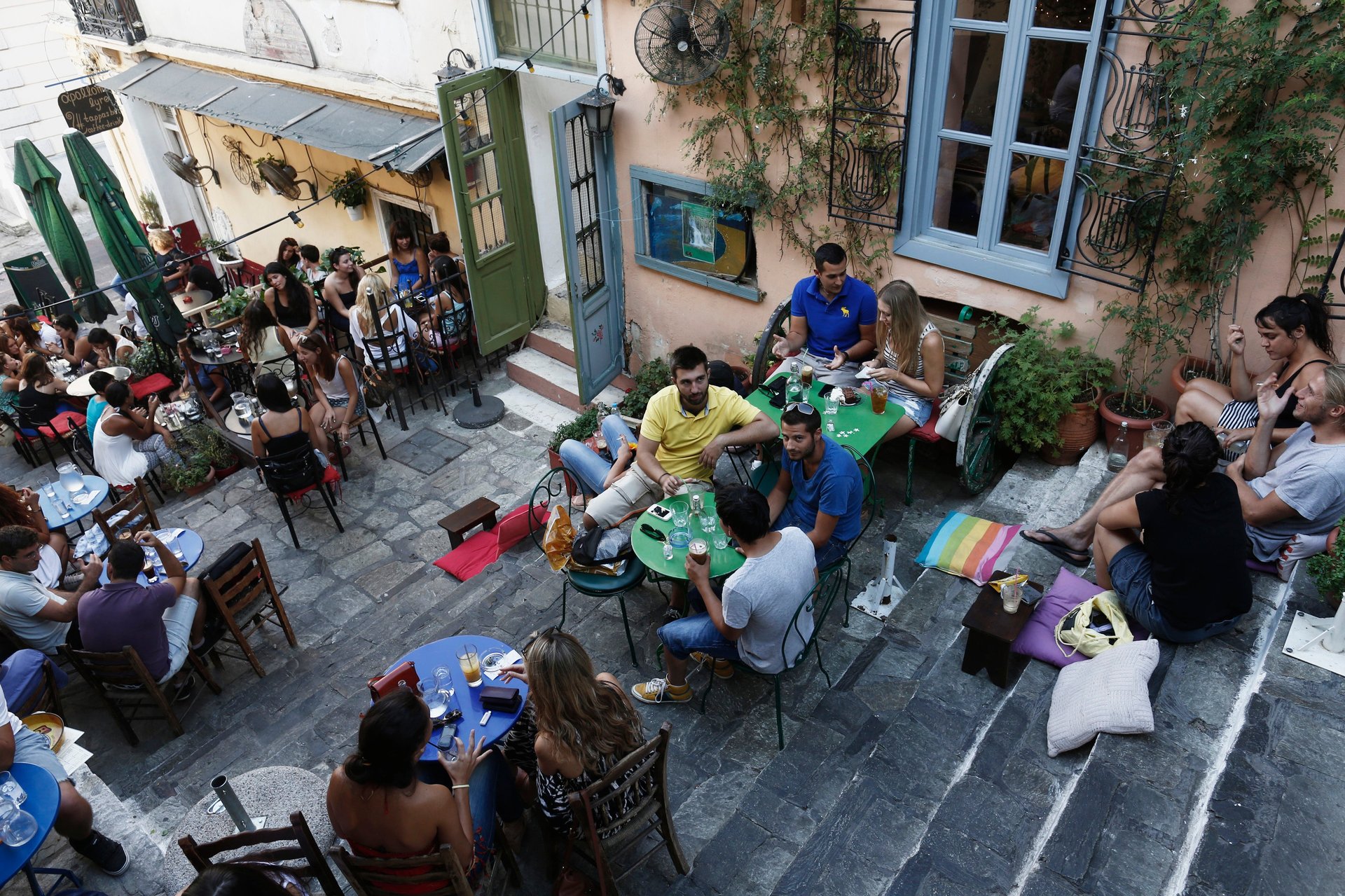
In order to legally venture outside for any of the above reasons, you must first send a text to a government-issued number with the number (one through six) that corresponds to your need, along with your full name and your address. If approved, you will receive a government code in response. Once outside, you must carry official ID so that when you’re stopped, police can check your code against your location. If, for example, you use the code for physical exercise and you’re obviously not exercising, police can fine you the equivalent of around $160. The same fine applies if you’re caught outside without a code.
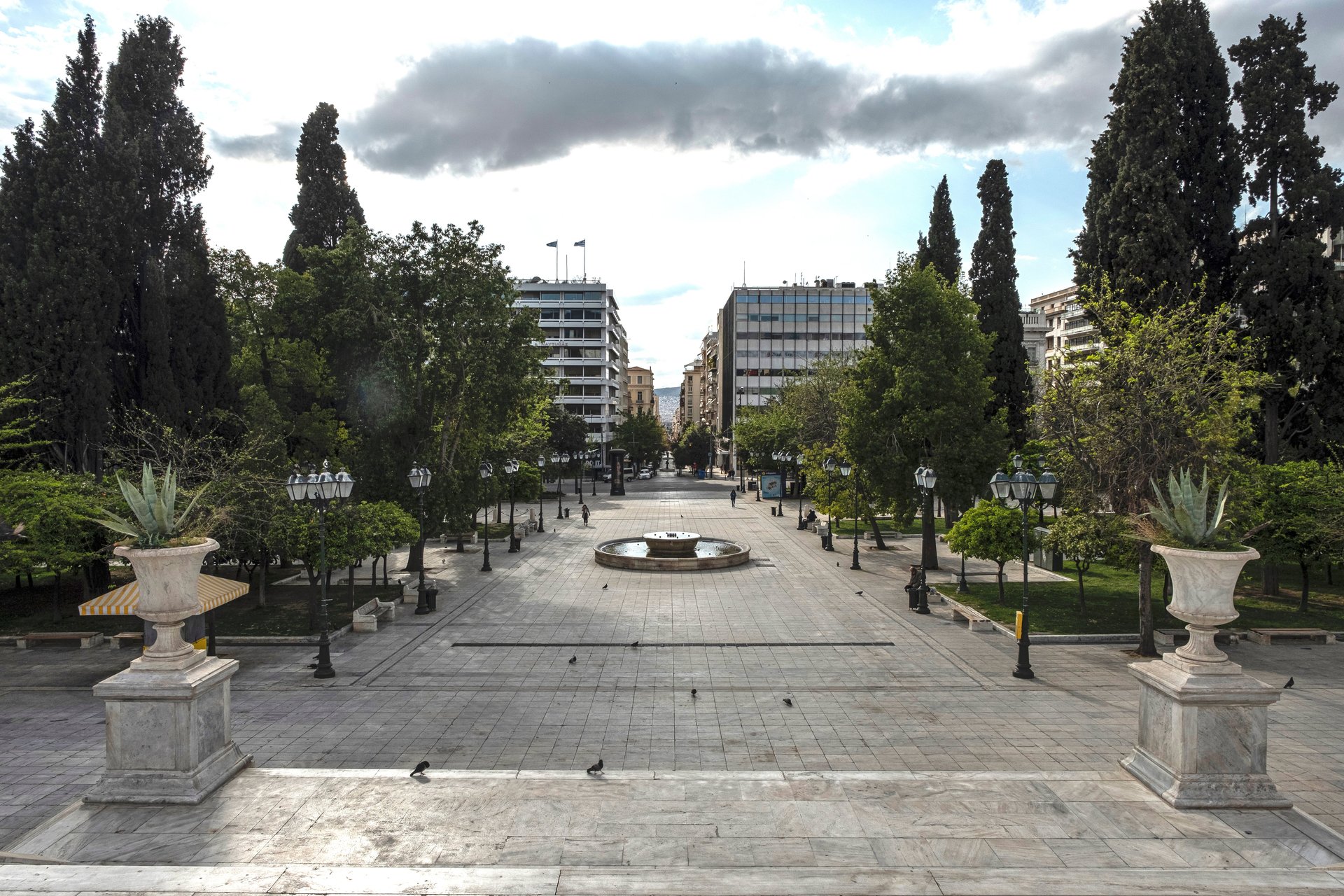
“We work with closed doors”

“Not everyone understands the difficulties of this job, either before or during the coronavirus,” Tsogkas says. “Some treat us as [mere] couriers, or as something inferior to them.” He admits this has always been true of how people treat delivery workers; but he has seen a shift in interactions with regular customers, despite the fear coronavirus has instilled in society and despite the new economic hardships many Greeks now face. “They appreciate the fact that during these difficult days, we still serve them.” Angelos Roussos, who opened a coffee shop with his wife in 2017, is confident things will return to normal as soon as the nationwide quarantine is lifted—although when that will be, no one knows for certain, of course. “I think [coronavirus] has affected businesses as a whole, but I think the balance will return quickly,” he says.
“Of course, the way the store works has changed, because we work with closed doors and we only serve from a takeaway and delivery window for the safety of the staff,” he explains. But, he says, “what has changed more is our psychological state: It’s one thing to work under normal conditions with carelessness, and another to be afraid of a pandemic and becoming sick.” This has been one of the hardest thing for him and his workers to cope with, he says.
The safety measures he and his staff have implemented—delivery only, contactless payment, constantly using disinfectant for hands and surfaces at the cafe—may help protect customer and staff from harm, but it has also impacted the way people now interact with each other, which, in a country known for its warmth and hospitality, is significant. “All this is very cold and faceless, because you lose personal contact with the customer,” he says.
Survival of the fastest (and cheapest)
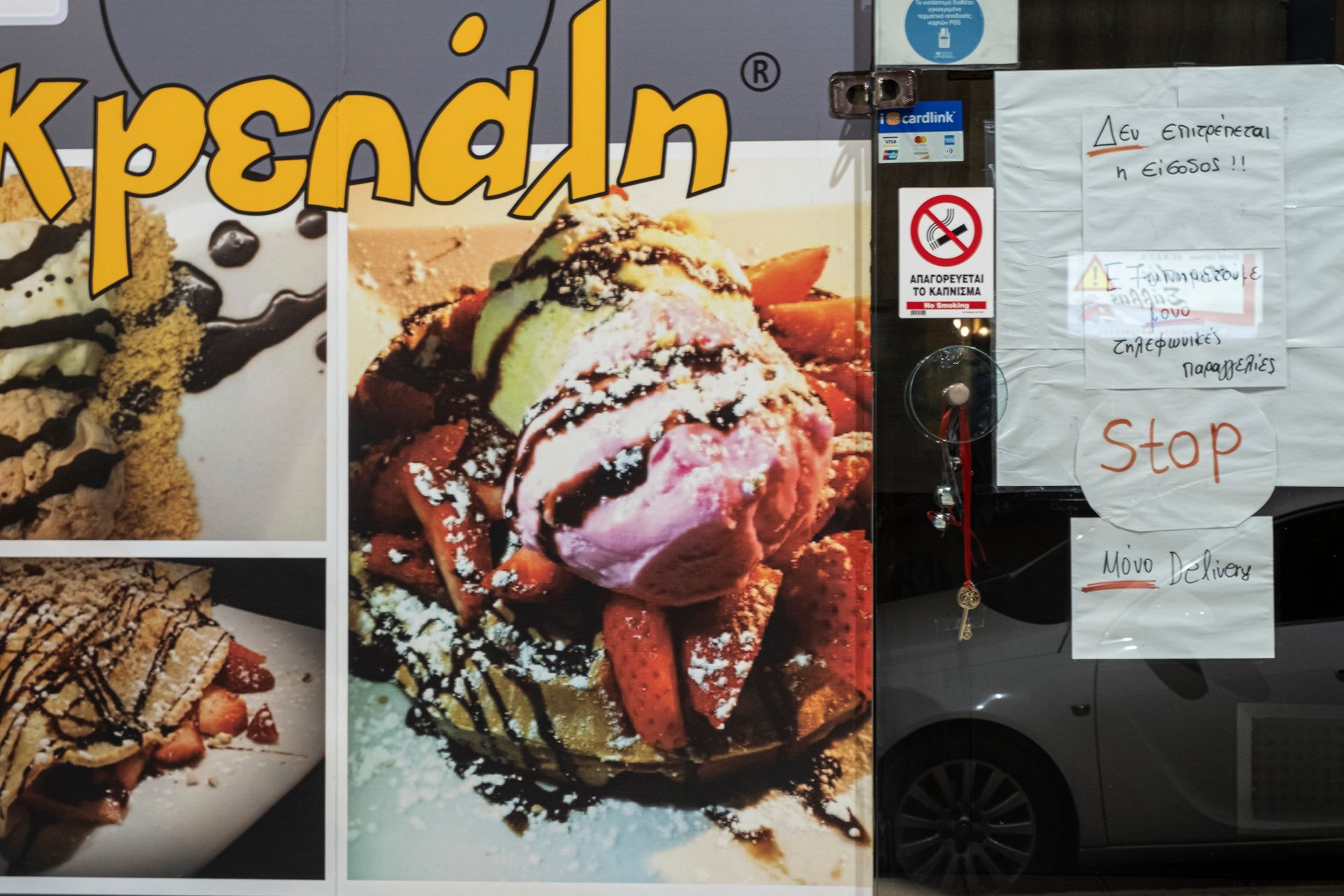
Of course, not all players in the food business are as equipped to adapt. Some types of food are easier and cheaper to prepare and deliver, and more affordable, than others.
Places that serve souvlaki—the quintessential Greek fast food of grilled meat wrapped in warm pita bread and stuffed with fries and tzatziki—and grilled meat are called Souvlagirikos. So-called fast food joints like this, along with pizzerias like Nonna Edda, are still open because they’re already set up for a delivery-only business.
Tavernas, or sit-down restaurants, are a staple of Athens social life. If this were an ordinary April afternoon, large group of diners would be ordering copious amounts of food and alcohol to share over the course of several hours at any number of tavernas. They’re almost entirely shuttered now, because they aren’t built for delivery. According to Pagonis, these restaurants have suffered the most during the lockdown. There’s evidence of this just down the street from Nonna Edda where he takes incoming orders for the upcoming shift, where Tavernas that sit on the normally bustling neighborhood square of Kaisariani stand empty.
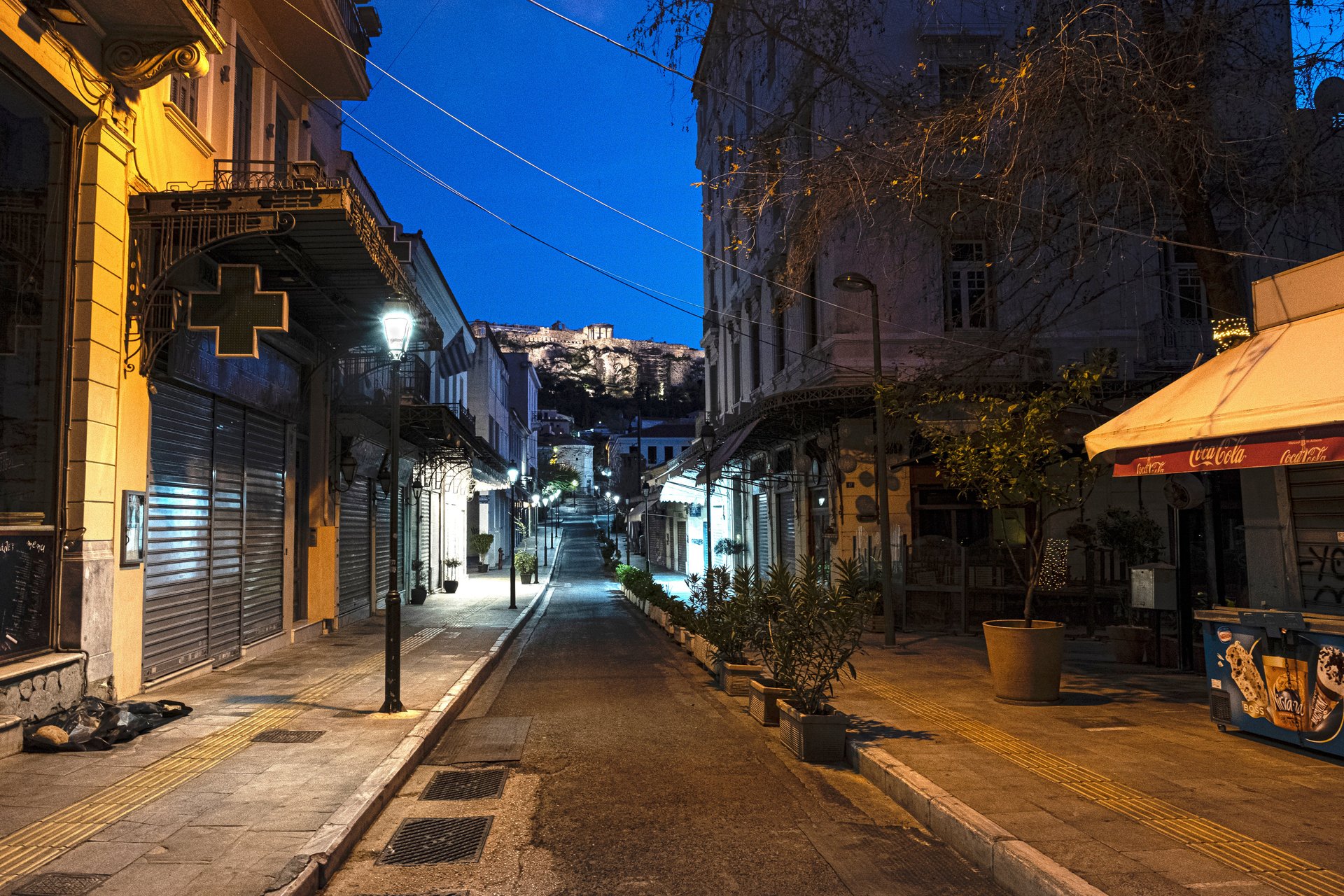
George Koukoulas, who owns and runs one of the restaurants, made the decision to close his business when Greece first went into lockdown in early March. If you operate a taverna like his, “It’s not clever to stay open only for delivery,” he explains. Koukoulas has owned restaurants since 2011, and by his judgement the expenses incurred to remain open for a few delivery orders per day, would far outweigh the cost of closing shop for a couple months, though he admits it’s a major setback, especially since he was preparing for a busy summer and tourist season. Now, he’s not sure when people will feel comfortable again to gather together to share meals.
“Greek people are fighters; we have some experience with this,” Koukoulas says, referring to the previous decade of financial woes. Like many Greeks who survived the nearly decade-long financial crisis, Koukoulas says he’ll get through this. “I am proud, not only of the government, but of all the people who accept these [new] measures and stay home.”
Some food delivery apps now have the option for contactless delivery, like Wolt, the Finnish tech startup that provides a food delivery platform of the same name, which was the first online delivery service in Greece to initiate a contact-free delivery option in the coronavirus outbreak. Now, all Wolt delivery orders are contact-free by default. Other food delivery services have followed suit, such as the popular efood and Click Delivery.
Even with precautions, remaining even as a delivery-only business has its risks. “Of course I’m scared, because we come into contact with people very often, which can affect my family at home—I think of my children, too,” explains Pagonis.
Beyond delivery
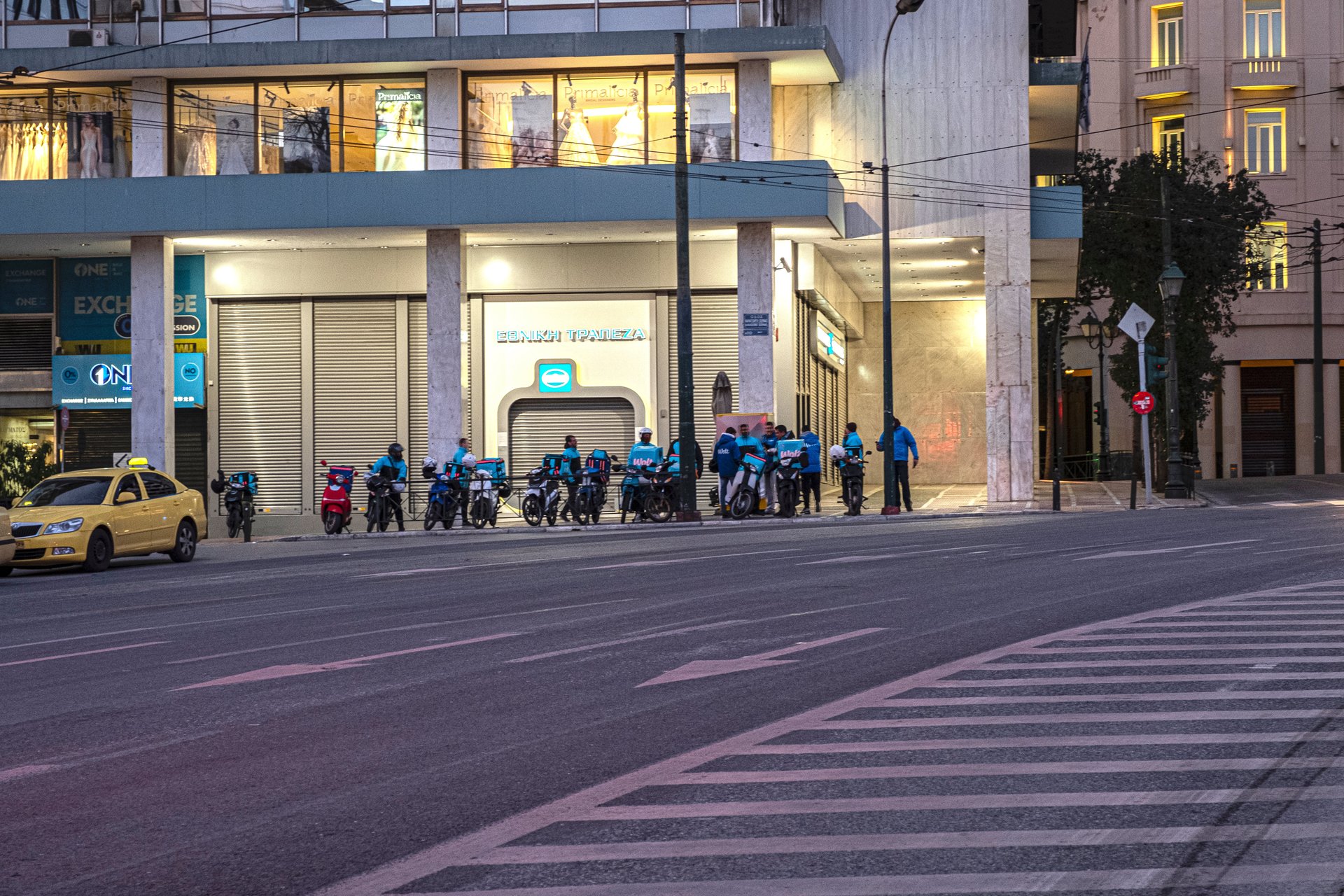
Nonna Edda first opened in 2008, just before the decade-long financial crisis hit Greece in full force, devastating the economy and pushing unemployment to a staggering 43.6% for people aged 15 to 24, and 21.5% unemployment overall by the end of 2017. Although the country officially exited the crisis era in August 2018, many Greeks still feel the lasting effects of the nearly 10 years of austerity measures.
“You don’t technically say that nowadays we’re in the midst of a crisis, but investment has been very weak,” explains Seraphim Seferiades, a political science professor at the Panteion University in Athens. “All the basic indicators show that the impact of the last crisis is very much with us.”
Now, with the addition of this new health crisis, it seems that Greeks are willing to spend even less money on ordering food to their homes. “Even though [people] are staying inside, they are scared…they don’t shop because they keep the money, because they are afraid of what will happen tomorrow,” explains Pagonis.
Elsewhere, delivery has offered a lifeline in the global pandemic economy, and even a boost for the delivery sector in its own right. Although supermarkets had offered delivery services long before the pandemic, it wasn’t common among the general population, a service mostly used by expats. When you go online to order groceries now, the next open slot for a delivery appointment is likely to be about 10-14 days out.
For pharmacies, the pandemic has been a catalyst for more than delivery service: Pre-coronavirus, telemedicine has been virtually nonexistent in Greece. Now, the government has fast-tracked an e-prescription program. Patients can now receive a prescription code from a physician via SMS or email, which pharmacists can fill via an online government portal.
No one can say with certainty the extent of the economic impact Covid-19 will have in the months, and years, to come. But for the time being, the delivery workers of Athens represent one of the few constants that have held steady in what is an otherwise uncertain and uneasy climate. As Tsogkas states, the pandemic may have heightened new risks in his line of work, but for the most part, it continues as usual, with the addition of hand sanitizer, gloves, and a mask.